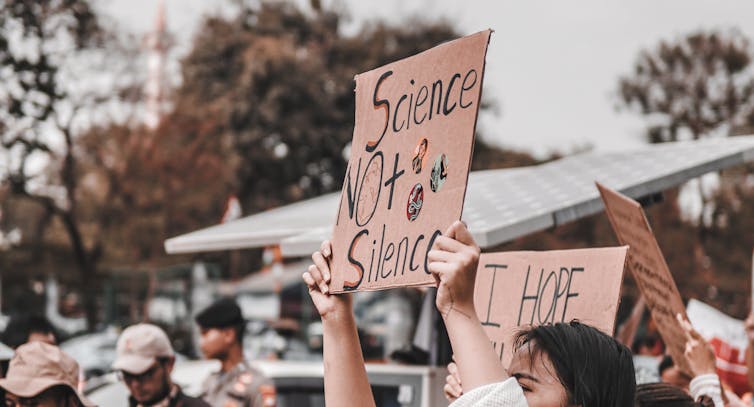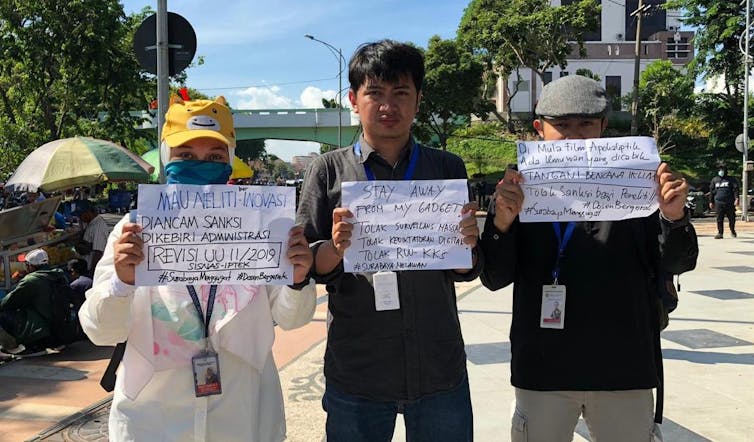Should Academics Offer Support to Student Protesters?

Despite warnings from universities and a threat from a minister, thousands of students still took to the streets protesting against controversial bills that jeopardize Indonesia’s democracy.
Some lecturers have endorsed their students in the protests amid pressures from universities and Ministry of Research, Technology and Higher Education, highlighting political dynamics in higher education institutions in Indonesia.
The ministry last month threatened sanctions to university rectors and academics that “mobilize student movement” or are involved in the protests.
While some universities distance themselves from the student movement, encouraging their students not to take part in the protest, some are not stopping their students from voicing their demands.
Academics’ role
Students began marching last week after the government and legislators enacted a revision to the anti-graft law, which weakens the country’s anti-corruption agency.
News media and social media accounts have reported allegations of police brutality in handling a wave of student protests in the past week in various cities across Indonesia. At least two student protesters from Halu Oleo University in Southeast Sulawesi have been killed.

Hundreds of scholars from across Indonesia have also voiced their concern over the revised anti-graft law.
Kunto Adi Wibowo, a lecturer in communication science, is amongst the 163 academics from Universitas Padjadjaran in Bandung, West Java that signed a petition condemning the anti-graft law.
“When there is political abuse, or when the public is dissatisfied with current sociopolitical conditions, it becomes imperative for academics to make what they have studied relevant and address the needs of the people,” he said.
Rizqy Amelia Zein, a lecturer in social psychology at Universitas Airlangga in Surabaya, East Java, says that university figures have a responsibility to involve themselves in the public sphere.
“We can’t stay silent when public interest is threatened, particularly those of us who are paid by taxpayers’ money. This becomes even more pressing when it involves good governance,” she said.
Channelling support through all avenues
Kunto argues that academics’ involvement during student protests and political upheavals can take several forms.
“Academics have a bigger role to play. First, we can help refine [students’] arguments. We can also write, publish analyses, and even show support to our students in social media,” he said.
Anisa Sri, president of the student body at Universitas Indonesia’s Faculty of Psychology, says that students look up to their lecturers for guidance during times of political crisis, urging them to be more involved.
“Students have more energy and sensitivity, but we have a gap in knowledge and academic competence in making comprehensive analyses of current situations”, she said.
Amelia further argued that the direct involvement of lecturers could boost students’ morale when voicing the concerns they have regarding the political state of their country.
“When lecturers in the streets are protesting, even just for a while, they [students] can see that this is an important issue – even their lecturers are taking their time to join them,” she said.
“Even if not, we can show public support through petitions for example, or in the classroom, at least it makes them realize that it’s good that you study hard, but it’s also good that you hear about the people.”
Amelia is one of the lecturers who participated in the student rally in Surabaya.

Mega Nur, a student at Gadjah Mada University in Yogyakarta who spoke during the student protests in the city said that some lecturers joined the protests too.
“There were lecturers that joined the masses, there were also other academics who gave speeches on the stage,” she said.
Accommodating students’ right to protest
To accommodate students who wanted to participate in the nationwide protests, a host of lecturers in universities across Indonesia have cancelled classes.
Some have even assigned extra points for reporting on the protests through photos and videos.
Kunto said that students could send him an email to be exempted from class to join the protest. However, he makes sure he accommodates those who did not want to join the protests.
“I support the student protests because I am an educator, and I always teach my students to be critical. When they attempt to do so, it is not ethical for me to forbid them,” he said.
“But, I cannot cancel my class because there are other students who don’t plan to join the protests for a number of reasons. I must respect their rights. To the best of my ability I will not discriminate between those who want to join the protests and those who don’t.”
Amelia instead chose to reschedule her class as a middle ground to accommodate the interests of all students.
“I am so grateful, not very often my psychology students are willing to join protests. To appreciate them, I rescheduled my class so that students can go to the streets, but for those who don’t it’s okay too,” she said.



























































































